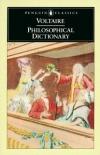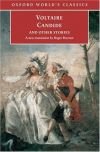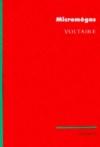
L'Ingénu is a satirical novella by the French writer Voltaire, published in 1767. It tells the story of a Huron called "Child of Nature" who, after having crossed the Atlantic to England, crosses into Brittany, France in the 1690s. Upon arrival, a prior notices depictions of his brother and sister-in-law, whom they …

Lettres philosophiques is a series of essays written by Voltaire based on his experiences living in England between 1726 and 1729. It was published first in English in 1733 and then in French the following year, where it was seen as an attack on the French system of government and was rapidly suppressed. Most modern …

Το Ζαντίγκ ή Το πεπρωμένο είναι μια φιλοσοφικό μυθιστόρημα του Βολταίρου πρωτοεκδομένο το 1747 με το όνομα Memnon. Έπειτα, επανεκδόθηκε το 1748 με τον σημερινό του τίτλο επεκταμμένο κατά μερικά κεφάλαια. Το έργο αυτό μας εξιστορεί τις περιπέτειες ενός φιλόσοφου στην αρχαία Βαβυλώνα. Ο Βολταίρος δεν επιχειρεί καμία …

Candide, ou l'Optimisme is a French satire first published in 1759 by Voltaire, a philosopher of the Age of Enlightenment. The novella has been widely translated, with English versions titled Candide: or, All for the Best; Candide: or, The Optimist; and Candide: or, Optimism. It begins with a young man, Candide, who …

Το Φιλοσοφικό Λεξικό είναι ένα έργο του Βολταίρου, γραμμένο το 1764. Είναι ένα σύνολο άρθρων τόσο φιλοσοφικών όσο και υπεράσπισης της δικαιοσύνης. Η διάσημη υπόθεση Calas στην οποία εμπλέχτηκε ο Βολταίρος αποτελεί επίσης ένα άρθρο. Πολλά άρθρα του φανερώνουν τον αντισημιτισμό του συγγραφέα, όπως για παράδειγμα τα …

Candide is the most famous of Voltaire's "philosophical tales," in which he combined witty improbabilities with the sanest of good sense. First published in 1759, it was an instant bestseller and has come to be regarded as one of the key texts of the Enlightenment. What Candide does for chivalric romance, the other …

"Candide" is the famous satire and best-known work by Voltaire. First published in 1759, "Candide" is the story of its central character who travels throughout Europe and South America experiencing and witnessing much misfortune on the way. It is within the clever construct of this narrative that Voltaire refutes the …

 English
English Español
Español Deutsch
Deutsch


